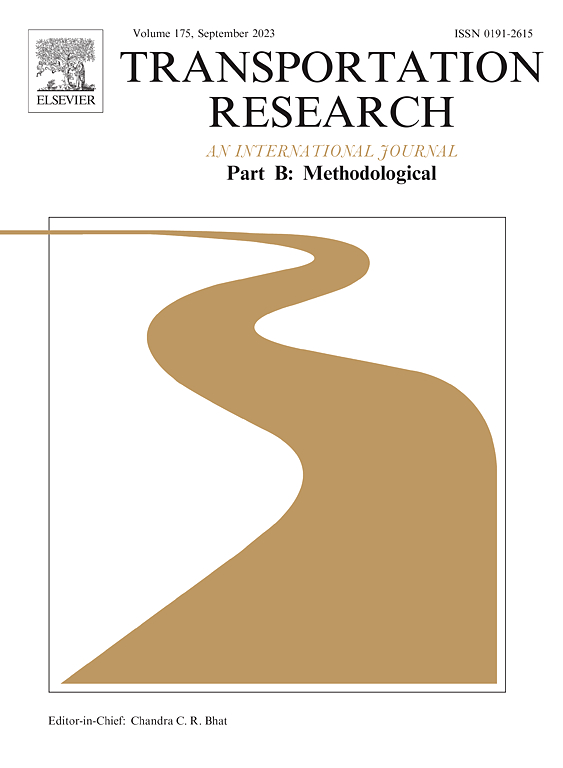管理道路和铁路网络中不确定的交通和社会外部性:定价与许可
IF 6.3
1区 工程技术
Q1 ECONOMICS
引用次数: 0
摘要
本文研究了拥挤的双式联运系统中交通外部性(仅影响乘客)和社会外部性(不影响乘客)的拥堵收费与可交易许可的相对表现。在这种情况下,重点是感染风险,就像在大流行中一样。我们研究了交通外部性和社会外部性都存在不确定性的情况下的相对绩效。早期文献只考虑随机交通外部性情况下价格和许可证的相对表现。数值结果表明,考虑到感染风险对社会成本函数的影响,当个人感染成本存在不确定性时,特别是当边际个人感染成本的不确定性增加时,价格管制可以预期比可交易许可方案表现更好。然而,政府可以通过允许许可的可融资性来提高可交易许可的绩效,或者根据随机参数的实现,积极参与许可的买卖来优化价格。研究结果为决策者在不确定性存在时选择最优工具来内部化多重外部成本提供了理论支持。本文章由计算机程序翻译,如有差异,请以英文原文为准。
Managing uncertain traffic and societal externalities in a road and rail network: Pricing versus Permits
This paper studies the relative performance of congestion pricing versus tradable permits for a congested bi-modal transport system with traffic externalities, that affect passengers only, and societal externalities that go beyond the passengers. The point in this case is infection risks, as in the pandemic. We study this relative performance for the case where there are uncertainties on both traffic externalities and societal externalities. Earlier literature considered the relative performance of prices and permits for the case with only stochastic traffic externalities. The numerical results indicate that, given how infection risks are likely to affect social cost functions, pricing regulation can be expected to perform better than a tradable permit scheme when there are uncertainties on private infection cost, especially when the uncertainties on the marginal private infection cost increase. However, the government can enhance the performance of tradable permits by allowing the bankability of permits, or by actively engaging in buying or selling permits to optimize the price in response to the realization of stochastic parameters. The results provide theoretical support for policymakers to choose the optimal instruments to internalize the multiple external costs when uncertainties exist.
求助全文
通过发布文献求助,成功后即可免费获取论文全文。
去求助
来源期刊
CiteScore
12.40
自引率
8.80%
发文量
143
审稿时长
14.1 weeks
期刊介绍:
Transportation Research: Part B publishes papers on all methodological aspects of the subject, particularly those that require mathematical analysis. The general theme of the journal is the development and solution of problems that are adequately motivated to deal with important aspects of the design and/or analysis of transportation systems. Areas covered include: traffic flow; design and analysis of transportation networks; control and scheduling; optimization; queuing theory; logistics; supply chains; development and application of statistical, econometric and mathematical models to address transportation problems; cost models; pricing and/or investment; traveler or shipper behavior; cost-benefit methodologies.

 求助内容:
求助内容: 应助结果提醒方式:
应助结果提醒方式:


